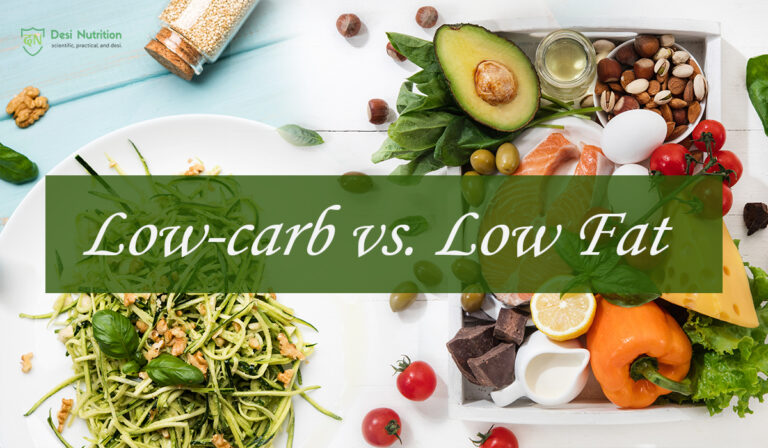Are you also confused between low-carb or low-fat diets for your health? In this article, we will have a face-off between low-carb vs. low-fat diets. So. Let’s get started!
You will come across multiple diets that claim to be the best for weight loss, health, and longevity. Deciding which one is best to follow could be challenging for many. For weight loss, specifically, the most popular diets are low-carb and low-fat. Now the question is which is right for you. Though both have their pros and cons, people need to consider a few points including their health benefits and potential drawbacks.
What Is a Low-Carb Diet?

First of all, let’s understand what a low-carb diet is. It is a diet in which you will restrict carbohydrates and focus more on protein and fat. The sources include meat, fish, eggs, nuts and oils. A few of the variations of such a diet are the ketogenic (keto) diet and Atkins diet. A ketogenic diet is low in carbs and high in fats while an Atkins diet allows you to have more carbs but in relatively low quantities.
- Typical Macronutrient Breakdown: In a low carb diet you will have around 5–10% carbohydrates, 60–75% fats, and 15–30% protein.
- Foods to Emphasize: A low carb diet usually includes meat, fish, eggs, leafy greens, non-starchy vegetables, nuts, seeds, and healthy fats (olive oil, avocado).
- Foods to Avoid: You will have to avoid sugar, grains, starchy vegetables (like potatoes), and most high-carb fruits in a low carb diet.
Benefits of a Low-Carb Diet
There are multiple benefits of a low carb diet for your health. Some of them are listed below:
- Weight Loss: People who are looking for weight loss can go for a low carb diet. Carbohydrates are the major source of energy and by limiting carbs, the body enters a state called ketosis, where it burns fat for energy, potentially leading to weight loss.
- Blood Sugar Control: By lowering carb content in the meals, low-carb diets can help stabilize blood sugar levels, making it a preferred choice for people with insulin resistance or type 2 diabetes.
- Reduced Cravings and Hunger: With the major focus on proteins and then fat a low carb diet can help you feel full for longer periods of time; hence helping to control your appetite.
Potential Drawbacks of a Low-Carb Diet
A low carb diet comes with many benefits, especially for people looking to lose some weight but just like a coin has two sides so does this diet. People who follow a low-carb diet, especially a keto diet might undergo potential drawbacks of the diet.
- Initial Adjustment Period: When starting a low-carb diet, people often experience “keto flu,” with symptoms like fatigue, headaches, and irritability.
- Potential Nutrient Deficiencies: Low-carb diets restrict certain fruits and vegetables to adhere to low-carb quantities in the meals. This could lead to lower fiber, vitamin C, and potassium intake causing deficiencies of these essential nutrients.
- Long-Term Adherence: People often find it challenging to adhere to the diet for a long period because restricting carbs can feel restrictive, and some people may struggle to maintain the diet over time.
What Is a Low-Fat Diet?

Now let’s come to the low-fat diet!
While a low-carb diet reduces the carb intake, a low-fat diet reduces the overall fat intake. A low fat diet focuses on carbs and protein instead of fats and proteins. Foods such as grains, fruits, vegetables, and lean meats are staples in this diet, while fatty foods like oils, butter, and fatty cuts of meat are limited.
- Typical Macronutrient Breakdown: In a low-fat diet you will get around 10–30% fats, 55–75% carbohydrates, and 15–20% protein.
- Foods to Emphasize: Focus on foods like fruits, vegetables, whole grains, lean protein (chicken, fish, legumes).
- Foods to Avoid: in a low fat diet you have to avoid butter, fatty meats, oils, high-fat dairy products.
Benefits of a Low-Fat Diet
- Heart Health: Low-fat diets, especially those rich in whole grains, fruits, and vegetables, have been associated with lower cholesterol levels and reduced risk of heart disease; hence improving your cardiovascular health.
- Weight Loss: Low fat diets help to reduce fat intake and can reduce calorie intake, helping some people lose weight.
- Improved Digestion and Gut Health: The high fiber content of many low-fat diets can aid digestion and promote a healthy gut microbiome. It also keeps you feeling full for longer times.
Potential Drawbacks of a Low-Fat Diet
Let’s discuss some potential drawbacks of a low-fat diet.
- May Not Keep You Full: You will lose weight when you consume less calories. But if you feel hungry all the time. Low-fat diets can be high in carbs, which may lead to spikes and drops in blood sugar, potentially causing hunger and cravings.
- Potential for High Sugar Intake: Some low-fat diets include processed foods that are low in fat but high in sugar, which can be detrimental to health.
- Difficulty in Obtaining Essential Fats: Fats are necessary for absorbing fat-soluble vitamins (A, D, E, and K), and a very low-fat diet may lead to deficiencies in these essential nutrients.
Low-Carb vs. Low-Fat: The Face Off
1. Weight Loss
- Low-Carb: Low-carb diets are often helpful in losing weight in initial stages at a faster rate. They reduce water weight faster and promote fat burning.
- Low-Fat: Low-fat diets are effective for gradual weight loss and may be more sustainable long-term for some individuals. They also promote a high intake of fiber-rich foods, which can contribute to satiety.
2. Heart Health
- Low-Carb: Low-carb diets, when high in healthy fats (like those in nuts and avocados), can improve certain heart health markers, like HDL (“good” cholesterol) and triglycerides. However, high intake of saturated fats may raise LDL (“bad” cholesterol).
- Low-Fat: Low-fat diets are associated with lower cholesterol levels and reduced risk of cardiovascular disease. Diets low in animal fats and high in fruits, vegetables, and whole grains are particularly beneficial for heart health.
3. Blood Sugar and Diabetes Management
- Low-Carb: By lowering carb intake, blood sugar levels are more stable, which can help people with type 2 diabetes or insulin resistance.
- Low-Fat: Low-fat diets can also help manage blood sugar, but they may require careful monitoring to avoid high sugar intake, especially if they rely heavily on refined carbs.
4. Sustainability and Lifestyle Compatibility
- Low-Carb: This diet is often more sustainable for people who enjoy protein and fats, and it can be effective for those with blood sugar concerns. However, people who enjoy a variety of grains and fruits may find it restrictive.
- Low-Fat: Many people find low-fat diets easier to follow long-term, especially if they prefer plant-based foods, whole grains, and a high intake of fruits and vegetables.
How to Decide: Which Diet Might Be Right for You?
Consider Your Health Goals
- Weight Loss: If your ultimate goal is to reduce weight then both diets can help with weight loss, so choose the one that fits your lifestyle and preferences best. A low-carb diet may be ideal for faster initial weight loss, while a low-fat diet may be more sustainable.
- Managing Blood Sugar: If you have insulin resistance or diabetes, a low-carb diet may offer better blood sugar stability. However, consult a healthcare provider to ensure it’s the right fit for you.
- Heart Health: Both diets can support heart health, but the focus should be on healthy fats in a low-carb diet and reducing processed foods in a low-fat diet.
Think About Your Food Preferences
- If You Enjoy Carbs: A low-fat diet that allows a variety of grains, fruits, and vegetables may be more enjoyable.
- If You Prefer Protein and Fat: A low-carb diet may be easier to stick with, as it emphasizes foods like eggs, meats, and healthy fats.
Personal Lifestyle and Sustainability
- Low-Carb for Appetite Control: If you struggle with hunger and cravings, a low-carb diet may help keep you fuller for longer due to its high protein and fat content.
- Low-Fat for Flexibility: A low-fat diet can be easier to manage in social situations or when dining out, as it doesn’t restrict certain food groups as much.
Frequently Asked Questions
Is it better to eat low carbs or low fat?
Ans. Deepening on your health goals, your personal preferences and your lifestyle, you will be choosing your diet. Both diets are good for your health though.
Will a low carb diet reduce belly fat?
Ans. A low carb diet helps to reduce fat faster initially by reducing your water weight. It will help you to reduce your overall weight including your belly fat.
Will I burn more fat if I eat less carbs?
Ans. A low carb diet is meant to reduce the intake of carbs so the body can burn more fat. Yes, you will burn more fat if you eat less carbs.




